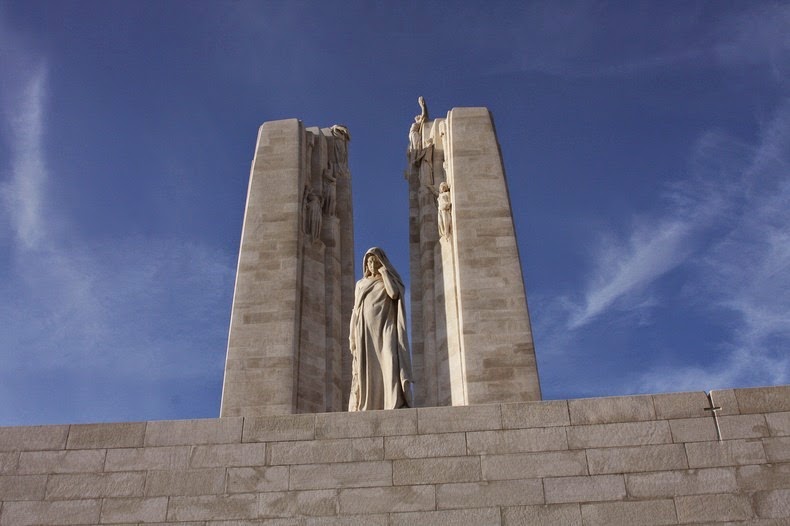The Canadian National Vimy Memorial is a war memorial located approximately eight kilometers north of Arras in France, near the town of Vimy. It is Canada's largest overseas national memorial. Situated on land granted by France to the Canadian people, the memorial towers over the scene of Canada's most recognizable First World War engagement, the Battle of Vimy Ridge, fought from 9 to 12 April 1917. The memorial commemorates all Canadians who were killed during the Great War of 1914-1918, but have no known grave. 60,000 Canadians were killed or missing during the war, out of which over 11,000 have no known grave. The imposing structure of the Canadian National Vimy Memorial bears the inscribed names of 11,168 missing Canadians, killed in action in France but whose remains have not been found or identified. The site of the memorial is also one of the few places on the former Western Front where a visitor can see the trench lines of a First World War battlefield and the related terrain in a preserved natural state.
The memorial was designed by Walter Seymour Allward, whose design was chosen out of 160 ideas submitted during a competition. Allward’s design consisted of two pylons 30 meters tall, representing Canada and France. One pylon has a carving of the maple leaf for Canada, the other plyon has the fleur-de-lis for France.
A number of figures including 20 human figures are sculpted on the monument. A group of eight figures high up on the top of the two pylons, called The Chorus, represent Justice, Peace, Hope, Charity, Honour, Faith, Truth and Knowledge. The Spirit of Sacrifice comprising of two figures – a dying soldier who has passed a torch to a comrade, lies between the pylons.
Two groups of figures located at each end of the front wall comprise seven figures called The Defenders. The group of three figures called Breaking of the Sword is on the south corner of the front wall. The group of four figures called Sympathy of the Canadians for the Helpless is at the north corner of the front wall. Above each group a gun barrel with laurel and olive branches represents peace.
Two reclining Mourning Parents are on the southern side of the memorial. A solitary figure called Mother Canada stands on the wall at the north-eastern side of the memorial. She bows her head and is looking down at a stone sarcophogus, representing Canada's war dead. The magnificent view across the Douai plain and the location of the old enemy of the time spreads out before her.
The memorial took monument designer Walter Seymour Allward eleven years to build. It was unveiled on 26 July 1936 in the presence of King Edward VIII and French President Albert Lebrun along with a crowd of 50,000.

The figure Mother Canada. Photo credit
The Spirit of Sacrifice Photo credit
One of the two Mourning Parents (father) Photo credit
The other Mourning Parent (mother). Photo credit
Breaking of the Sword Photo credit
The Chorus on top of the two pylons. Photo credit
Another view of The Chorus. Photo credit
Trenches preserved in concrete. Photo credit
Names of all Canadian soldiers killed in action that do not have a grave. Photo credit
Sources: Wikipedia / The Great War























It is a truly amazing site to behold after being beautifully restored for the 90th anniversary of the Battle of Vimy Ridge back in 2007. Spent a few hours there alone in February of 2012. Do some research before you go so you know what the statues represent. If you are in the region it is well worth the trip.
ReplyDeleteBeen there too. Touching.
ReplyDelete